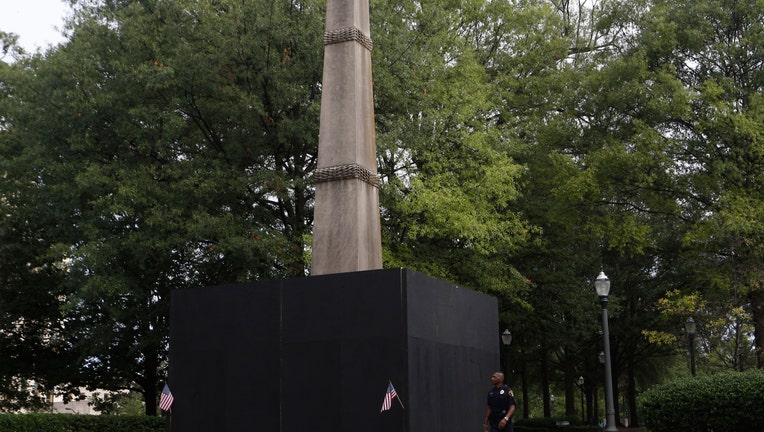Confederate monuments coming down around South amid protests

Birmingham police officer Glendon Archie guards the confederate monument in Linn Park after Birmingham Mayor William Bell ordered it covered August 18, 2017 in Birmingham, Alabama. Alabamas attorney general Steve Marshall sued the city of Birmingham
BIRMINGHAM, Ala. - Sarah Collins Rudolph thought she’d never see what happened in her hometown: Prompted by protests, the city removed a 115-year-old Confederate monument near where her sister and three other black girls died in a racist church bombing in 1963.
A wave of Confederate memorial removals that began after a white supremacist killed nine black people at a Bible study in a church in South Carolina in 2015 is again rolling, with more relics of the Old South being removed from public view after the killing of George Floyd by police in Minnesota.
In Birmingham, where Rudolph lives, the graffiti-covered, pocked base of a massive Confederate monument was all that remained Tuesday after crews dismantled the towering obelisk and trucked it away in pieces overnight. Other symbols came down elsewhere, leaving an empty pedestal in Virginia and a bare flagpole in Florida.
Rudolph, whose sister Addie Mae Collins died in the bombing of 16th Street Baptist Church, had to see the sight for herself. She lowered a protective face mask to take in the absence of an edifice she long considered a symbol of oppression.
“I’m glad it’s been removed because it has been so long, and we know that it’s a hate monument,” said Rudolph, 69. “It didn’t represent the blacks. It just represented the hard times back there a long time ago.”
Confederate symbols across the South have been targeted for vandalism during demonstrations sparked by Floyd’s death in police custody in Minneapolis. Now, even some of their longtime defenders have decided to remove them.
In Alexandria, Virginia, it was the United Daughters of the Confederacy that took action early Tuesday, removing the statue of a soldier gazing south from Old Town since 1889. And outside Tampa, Florida, a Sons of Confederate Veterans chapter lowered a huge Confederate battle flag that has long been flown in view of two interstate highways.
SEE ALSO: Athens mayor, commissioners call for the relocation of Confederate monument
Birmingham took down the obelisk a day after protesters tried to remove the monument themselves, during one of the many nationwide protests. Crews were preparing to finish the job by pulling up the base.
The monument had been the subject of a protracted court battle between the city and state, which passed a law to protect Confederate icons after rebel monuments were challenged and removed following the killings at Emanuel African Methodist Episcopal Church in Charleston, South Carolina.
Alabama Attorney General Steve Marshall filed a lawsuit on Tuesday against the city of Birmingham, seeking to fine the city $25,000 for violating the state law. Mayor Randall Woodfin said earlier this week that the fine was more affordable than the cost of continued unrest in the city. Online fundraising drives have raised more than enough money to pay the fine.
The state lawsuit does not specifically ask Birmingham to restore the monument.
SEE ALSO: Virginia Gov. Ralph Northam to announce removal of Confederate Gen. Robert E. Lee statue
Work to remove the monument began Monday, which was Alabama’s holiday honoring Confederate President Jefferson Davis, who was sworn in Montgomery. There, on the same day, someone knocked over a statue of Confederate Gen. Robert E. Lee outside a mostly black high school named for him.
Four people were arrested on criminal mischief charges, and the toppled statue was removed.
In Alexandria, a city spokesman said the United Daughters of the Confederacy informed the city on Monday that it would remove the statue, and the city’s only role was to provide traffic support. By morning, the pedestal was all that was left. City officials were not told where the statue was taken.
Titled “Appomattox,” it depicts a solitary Confederate soldier, his head bowed slightly. In 1890, a state law was passed barring local officials from ever removing it. That law was repealed earlier this year.
Alexandria Mayor Justin Wilson tweeted photos of the removal on Tuesday, saying “Alexandria, like all great cities, is constantly changing and evolving.”
In Birmingham, Rudolph saw the removal of the monument as unfinished business from decades ago. The more than 50-foot-tall (15-meter-tall) memorial to Confederate soldiers and sailors was located just blocks from the church where Rudolph was badly injured and her sister died when a bomb went off on a Sunday morning decades ago.
“The things that we were fighting for in the ’60s aren’t solved yet,” said Rudolph, who testified against Ku Klux Klansmen convicted in the bombing. “We shouldn’t be treated the way they treat us.”
___
Associated Press writers Kim Chandler in Montgomery, Alabama; and Matthew Barakat in Falls Church, Virginia; contributed to this report.

